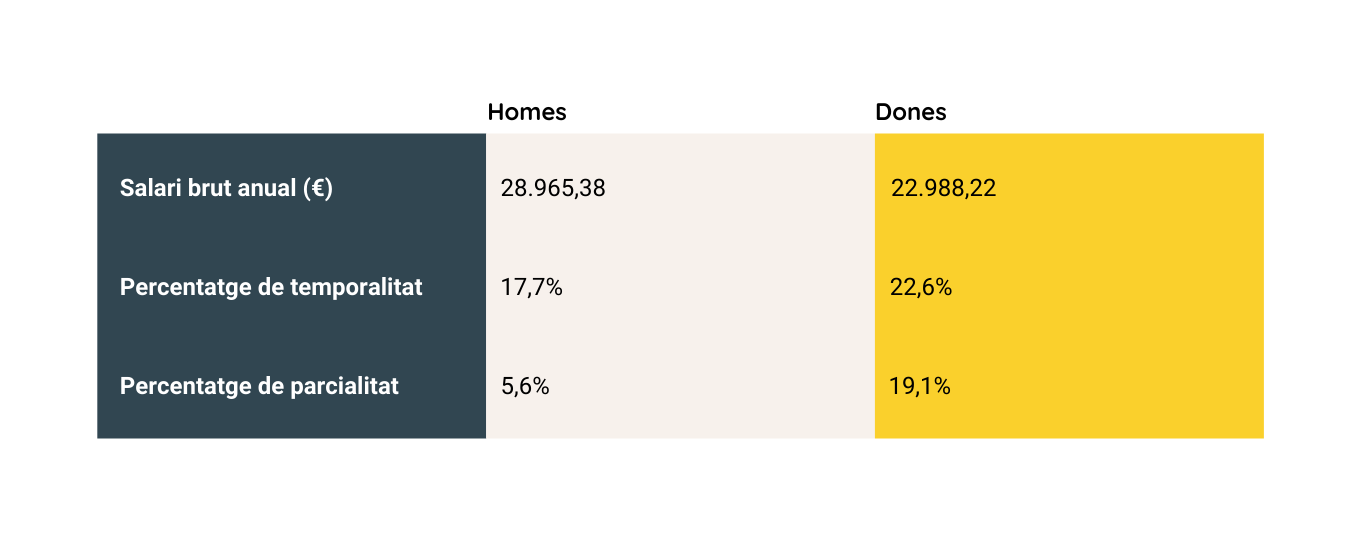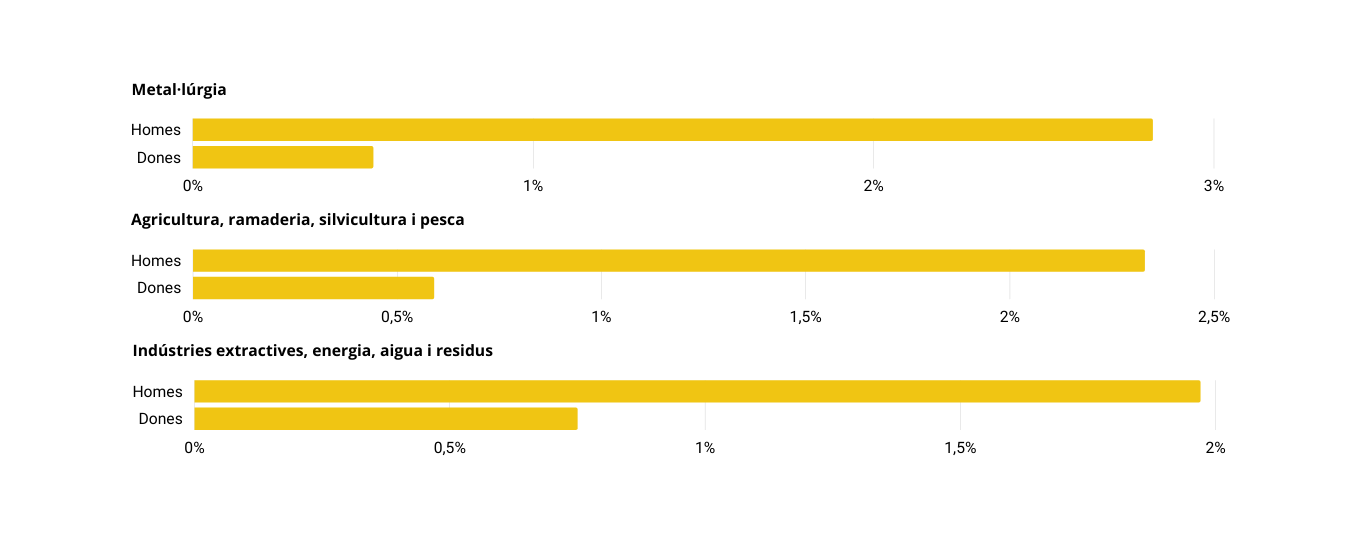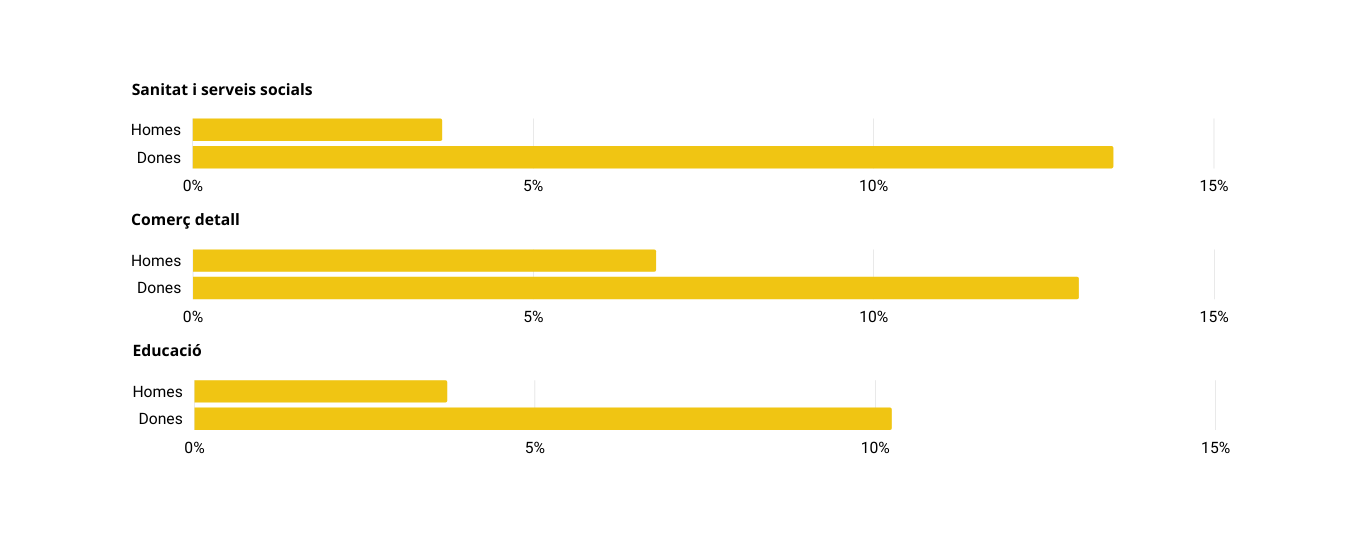

Women and business: a gap that is not closing
The wage gap between men and women is 12.1% in Catalonia. The data has fallen in recent years, but it is narrowing so slowly that it would take decades to close it completely.
What does a 12.2% pay gap mean? It’s very simple: as Idescat reports, while men’s gross annual salary is 28,965.38 euros, women earn an average of 22,988.22 euros. This means a difference of 5,977.16 euros per year or, in other words, according to UGT, women work 43 days a year for free. But the gender gap does not only translate into lower wages.
The inequalities between men and women in the world of work are also evident in much more temporary and even more part-time work. This is reflected in the Observatori del Treball i el Model Productiu of the Generalitat de Catalunya, which has developed a data visualisation with a gender perspective. While 22.6% of women of working age have temporary contracts, the percentage for men is 17.7%. Likewise, 19.1% of working women have part-time contracts, compared to 5.6% of men.
This clearly translates into a loss of talent in companies and a break in many career paths. Women, who have lower unemployment rates than men, prioritise work-life balance over recognition and success at work, especially after having children. This inequality is also reflected in the report on the use of time produced by the Institut Català de les Dones (Catalan Women’s Institute) and in the percentages of women’s representation on boards of directors.
Women directors, breaking taboos
Despite the fact that the Codi de Bon Govern sets as an objective that boards of directors should have at least 40% female representation. Despite the fact that Royal Decree Law 6/2019, the well-known Equality Law, states in articles 45 and 46 that companies with more than 50 employees must draw up and apply an equality plan; and in article 75 it recognises the participation of women directors. Even so, female managers continue to be an exception in private institutions.
This is reported annually by the Observatori Dona Empresa i Economia. In the latest report for 2021, the organisation lamented that, in Catalan companies, women only represent 25.3% of the positions on boards of directors, 18.5% occupy positions of presidency and only 15.3% of general management. This means, according to the observatory, a flagrant loss of talent in each of the hierarchies.
Moreover, the organisation also warns that only 12% of the 2,657 companies subject to the Equality Law comply with article 75, which stipulates, as does the Codi de Bon Govern, that women should represent at least 40% of the positions on boards of directors. This is a figure that has remained stable over the last seven years.
At the same time, of the total number of companies, 158,311 (84%) have only one director (72% men, 23% women and 5% companies and others) and, therefore, the percentage of companies with women on their boards is increasing. The observatory also regrets that inequality in positions of responsibility is reproduced in the public sector.
At the same time, the organisation notes that, as the size of companies increases, “it is normal for there to be more women in management positions,” but it is surprising that in companies with more than 100 workers, 37% of companies have no female directors. This percentage rises to 43% in companies with 50 to 100 workers and rises to 62% in companies with fewer than 50 workers.
Women researchers, still the exception?
While the number of women scientists in public administration and higher education is close to that of men, the gap is widening steadily in business. In private institutions there are 17,985 men, including researchers, technicians and other support staff, while there are only 8,959 women.
In fact, if we analyse the data by sector, women have a much lower presence than men in sectors such as agriculture and livestock, energy, metallurgy, construction and information and communication technologies. The evolution of employment in these sectors has not changed substantially over the last seven years.
In contrast, women are in the majority in other sectors, such as real estate activities, administrative activities and public administration. In four areas of work in particular, the presence of women is particularly significant: education, health and social services, retail trade and cultural activities. Precisely those sectors where average wages are lower and working conditions are worse. Will Catalan society be capable of bridging this gap, which is widening on so many fronts at the same time, at a rapid pace?
If you want your business to make a giant leap, use 11Onze Business. Our business and freelancer account is now available. Find out more!








Unes dades molt a tindre en compte, el dret laboral és importantíssim tant salarial com en condicions confortables de convivència que et permetin la continuïtat laboral cómoda, respectuosa i de lliure expressió.
Per desgràcia encara ens queda molt camí per fer, tot i que sembla que anem ben encaminats, realment són unes dades per tenir en compte.
👍
👌
🙏
👏✊✊
Gràcies, Daniela!
Que cadascú PUGUI FER el que li vingui de gust, sense haver de demostrar res a ningú.
Exacte Mercè! Gràcies pel teu comentari 💜
Ok 👍
Mentre al mon i la societat identifiquin el genere, com l’ d’etiqueta que aporta un valor determinat,i no com persones que tenent i aporten el valor que es demana estarem anys amb ser la societat on conviuen persones de diferents generes
Tenim una societat en conjunt lluny d’aquesta convivència! Gràcies, Alícia pel teu comentari💜